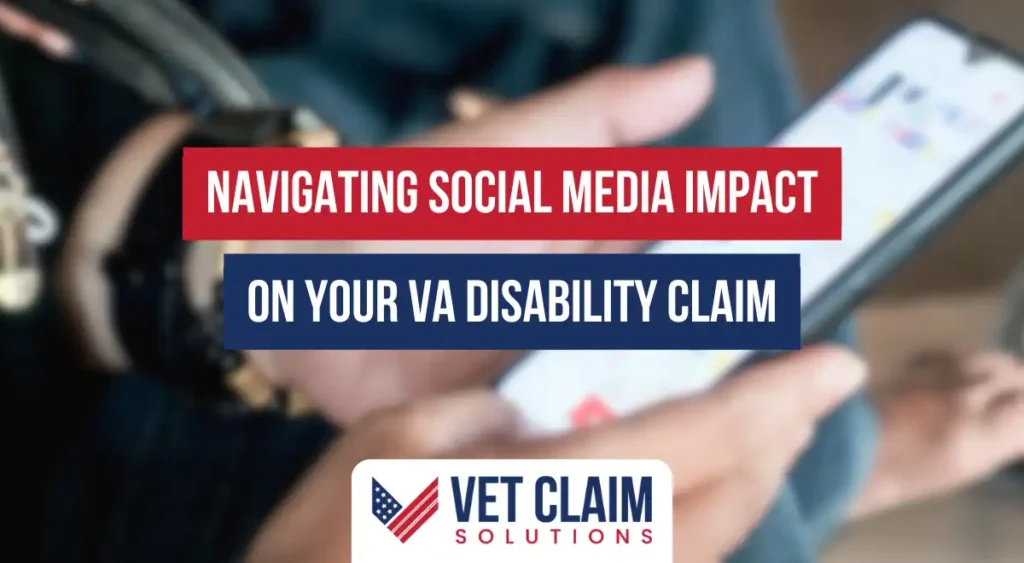You probably use social media every day. Many of us share updates, photos, and bits of our lives online without a second thought. But if you’re a veteran with a pending or approved VA disability claim, those posts could matter more than you think.
It’s truly important to understand The Impact of Social Media on Your VA Disability Claim: What Veterans Should Know. What you share online could potentially be viewed by the Department of Veterans Affairs (VA). Knowing about The Impact of Social Media on Your VA Disability Claim: What Veterans Should Know can help you protect your hard-earned veterans benefits.
Think about it like this. You served your country, faced challenges, and now deal with service-connected conditions, needing to establish a clear service connect. Getting the disability benefits you earned is crucial for your well-being, whether it’s for a short term disability or a long term disability.
Yet, a seemingly innocent photo or comment on a social media site might unintentionally raise questions about your disability case. This isn’t about hiding, but about understanding how your digital footprint can be interpreted, sometimes out of context. It’s a factor every veteran claiming va disability needs to consider.
Why Does the VA Look at Social Media?
The Department of Veterans Affairs has a duty to manage resources responsibly. They must confirm that disability benefits go to those who genuinely qualify based on established regulations. This involves verifying the information provided during the va disability claim process.
Part of this verification can include reviewing publicly available information, which often includes social media profiles. If details in your claim file appear inconsistent or trigger concerns, VA investigators might look online using social media as an investigative media tool. This review is part of maintaining the integrity of the veterans disability system.
The main reason is to identify potential fraud or misrepresentation in disability claims. While the vast majority of veterans are honest, the VA actively looks for situations where a veteran’s reported limitations seem to conflict with their observable lifestyle. Your posts on a media site can offer snapshots of that lifestyle, which may or may not be accurate representations of your daily reality.
VA investigators aren’t constantly monitoring every veteran’s social media feed. Such reviews usually occur if specific questions arise during the claim evaluation or a periodic review, perhaps during considerations for increased disability ratings. However, veterans should be aware that social media is a resource the VA can and sometimes does utilize.

How Can Social Media Hurt Your VA Claim?
The primary danger lies in perceived inconsistencies. If your posts on social media appear to contradict the information you provided to the VA about your disabilities, it can create significant hurdles for your claim. VA examiners and raters look for discrepancies between your stated limitations and how you present yourself online.
Inconsistent Physical Activities
This is a frequent source of trouble for veterans pursuing disability claims. Suppose you have filed a claim for a severe back condition that limits your ability to lift, bend, or remain standing for extended periods. However, you then post recent photos from a demanding weekend hiking trip or show yourself helping a friend move heavy furniture.
Alternatively, perhaps you assert that serious knee problems prevent you from walking significant distances. Check-ins at large amusement parks, extensive shopping malls, or photos showing you playing sports like basketball could be detrimental. Even older photos, if posted recently without clear dating (like “Throwback Thursday”), might cause confusion and raise doubts about your current condition.
The VA might interpret these posts as evidence that your condition, perhaps one of your orthopedic disabilities, isn’t as functionally limiting as stated in your application or C&P exam. They could question the severity level impacting your disability rating or even the validity of the service connect itself. Such discrepancies can lead to claim denials or proposals to reduce existing benefits for veterans disability.
Inconsistent Mental Health Statements
Mental health disability claims, such as those for post-traumatic stress disorder (PTSD), anxiety, depression, or conditions resulting from military sexual assault, often involve symptoms like social isolation, difficulty managing crowds, or diminished interest in activities. If your va disability claim documentation describes these struggles, but your social media presence paints a picture of frequent partying, extensive travel, or constant engagement in large social gatherings, it creates a potential conflict. This doesn’t imply you cannot experience good days, but a pattern of posts seemingly at odds with your reported symptoms raises red flags.
For instance, stating you avoid public spaces due to severe anxiety related to post-traumatic stress, then frequently posting photos from crowded concerts, packed festivals, or busy public transport, presents an inconsistency. Describing persistent, debilitating depression while maintaining an online feed filled exclusively with upbeat, high-energy activities and social engagements can also seem contradictory. Context is easily lost online, and VA personnel might not grasp the full picture from isolated posts or snapshots.
They might suspect the impact of the mental health disability is overstated, potentially affecting the assigned disability rating. This perceived mismatch could undermine the credibility of your entire disability case. Conditions like traumatic brain injury (TBI) can also have mental health components, and similar caution applies.
Statements About Employment
Online activity related to work is particularly critical if you are receiving or applying for Total Disability based on Individual Unemployability (TDIU), sometimes referred to as VA unemployability. TDIU benefits are specifically for veterans whose service-connected conditions prevent them from securing and maintaining substantially gainful employment. Posting about side jobs, freelance work, running a small business, or even actively searching for jobs could contradict your TDIU claim status.
Discussing your “exciting new business venture,” sharing photos of yourself performing work tasks (even if volunteer or part-time), or complaining about work-related stress can cause serious problems. LinkedIn profiles suggesting an active job search, listing extensive work skills, or indicating current employment might also be reviewed. Anything posted online suggesting you possess the capacity to work could jeopardize your TDIU status or prevent approval, impacting crucial veterans benefits.

Location Check-ins and Travel
Where you check in online and the nature of your travels can also be relevant. If you claim severe mobility issues, conditions like agoraphobia, or symptoms significantly worsened by travel (common with certain types of traumatic brain injury or stress disorder), frequent posts about long road trips, physically demanding vacations, or international travel might appear inconsistent. Claiming agoraphobia clashes directly with numerous check-ins from distant cities or crowded tourist attractions.
While having a disability doesn’t mean confinement or preclude travel entirely, showcasing extensive, frequent, or physically strenuous trips could raise suspicions at the Veterans Affairs. This is particularly true if these activities seem to contrast sharply with limitations described in your medical records, C&P examination results, or personal statements submitted with your va disability claim. Consistency between your documented limitations and online portrayal remains a key factor.
Timelines and Dates
Sometimes, social media posts can inadvertently create confusion regarding the timeline of your condition’s onset or severity. You might post an old photo (“throwback”) showing you engaged in an activity you now claim is impossible due to your service-connected disability. If the post isn’t clearly marked as being from the past, someone reviewing your file might mistakenly interpret it as evidence of current ability.
Always be mindful of how undated or ambiguously dated content might be perceived by VA personnel evaluating your disability claims. Maintaining consistency between the timeline presented to the VA regarding your health disability and what appears online can prevent misunderstandings. This clarity helps during the entire process of managing your veterans benefits.
Understanding The Impact of Social Media on Your VA Disability Claim: What Veterans Should Know
It’s essential to recognize the potential connection: The Impact of Social Media on Your VA Disability Claim: What Veterans Should Know is fundamentally about realizing that your online content can be treated as evidence. VA investigators or claims adjudicators might view posts through a skeptical lens, searching for information that could potentially undermine the validity or severity of your claim.
Keep in mind that context is often lost in the digital space. A single photograph capturing a rare moment during a “good day,” where you managed an activity usually beyond your capacity, doesn’t negate your overall disability. However, an investigator reviewing your claim might lack this crucial context; they only see the isolated picture or the brief post.
They might incorrectly interpret a photo of you smiling at a family event as proof that you aren’t truly struggling with depression or PTSD. They could see a picture of you lifting your grandchild as evidence that your claimed shoulder injury or orthopedic disabilities aren’t significantly limiting. It might seem unfair, but these interpretations can occur because the reviewer lacks the full personal story behind that online snapshot.
The responsibility often rests on the veteran claiming va disability to provide sufficient evidence supporting their limitations. Contradictory information gleaned from social media can make fulfilling this burden significantly more challenging. Such perceived inconsistencies can lead to requests for additional C&P exams, supplemental evidence, or, in some cases, outright denial of the claim or reduction of an existing disability rating, possibly even affecting housebound status considerations.
What Types of Social Media Does the VA Monitor?
Generally, any information that is publicly accessible online could potentially be reviewed. This encompasses popular platforms like Facebook, Instagram, X (formerly Twitter), LinkedIn, and even platforms like a YouTube channel or personal blogs. If your profiles and posts on these social media sites are set to “public,” anyone, including a VA investigator or contractor, can view them without needing special access.
What about private profiles? Setting your accounts to private (e.g., “Friends Only” on Facebook) provides a significant layer of protection, but it isn’t completely foolproof. Posts made by your friends where you are tagged might still be public, depending on their settings. Furthermore, screenshots taken by someone within your private network could potentially be shared and eventually find their way to VA investigators, particularly in cases involving suspected fraud.
Consider your broader online activities as well. Contributions to public forums, comments left on news articles or blogs, participation in online hobby groups, or even details on online dating profiles could potentially be viewed and considered. Your overall digital footprint extends beyond just your primary social media profiles used as a social media tool.
Think holistically about the picture your collective online presence paints. Does it generally align with the day-to-day realities of living with your service-connected condition, whether it’s hearing loss, a mental health disability, or physical limitations? If significant discrepancies exist, understand that they might be noticed and could have disturbing implications for your veterans benefits.

Real-Life Scenarios (Plausible Examples)
Let’s consider some hypothetical situations to illustrate how online activity can impact a va disability claim. These are not actual client comments or specific cases but reflect common issues encountered.
Imagine “David,” a veteran claiming va disability for severe bilateral knee conditions that, according to his claim, prevent him from standing or walking for more than brief periods. His public Facebook profile, however, features several recent photos and a video of him proudly participating in a community 5k fun run with his family. Even if he experienced significant pain, walked most of the course, and needed days to recover, the visual evidence alone could raise serious doubts for the VA rater assessing his functional limitations and disability rating.
Consider “Maria,” who has a high disability rating for PTSD linked to military sexual assault, with documented symptoms including agoraphobia and severe social anxiety. She states in her VA paperwork that she rarely leaves her home due to overwhelming anxiety in public or crowded situations. However, her public Instagram account is filled with frequent check-ins and enthusiastic photos from packed concerts, busy downtown bars, large sporting events, and international travel. This vibrant online portrayal directly conflicts with the documented severity of her symptoms related to post-traumatic stress disorder.
Think about “Robert,” who receives TDIU benefits (VA unemployability) due to debilitating back and shoulder problems stemming from service. He develops a passion for woodworking as a therapeutic hobby and begins posting photos of his intricate creations on a popular craft website and his personal blog, occasionally mentioning selling pieces at local craft fairs to cover material costs. While intended primarily as therapy, posts suggesting a “side business,” regular physical exertion, or income generation could trigger a review of his unemployability status and potentially lead to termination of these crucial veterans benefits.
These scenarios highlight how easily everyday online content can create perceptions that undermine a disability case. Innocent posts, vacation photos, or hobby updates can be misinterpreted when viewed without the complete context of the veteran’s life and struggles. Claiming va benefits requires careful consideration of all presented information.
Protecting Yourself: Best Practices for Veterans
You don’t necessarily need to abandon social media entirely. However, being aware of the potential risks and taking proactive steps can help safeguard your VA disability claim and benefits. Here are some practical measures:
Review Privacy Settings
This is your most immediate and effective line of defense. Carefully go through the privacy and security settings on all social media platforms you use, including Facebook, Instagram, X, LinkedIn, and others. Set your profile visibility to the most private option available, typically “Friends Only” or equivalent.
Restrict who can view your posts, photos, personal information, and friend lists. Platforms like Facebook often allow you to control the audience for each individual post – use these features diligently. Importantly, check if these settings apply retroactively to past posts; many platforms have an option to limit the visibility of older content.
Think Before You Post
Adopt a habit of pausing and reflecting before sharing anything online. Ask yourself: How might this photo, video, check-in, status update, or comment appear to someone objectively reviewing my VA claim file? Could it potentially be misinterpreted or taken out of context?
Does this post generally align with the limitations and symptoms I have described to the VA and my healthcare providers? This doesn’t mean censoring all joy or accomplishment. However, be mindful of the overall picture you present; while a single post is unlikely to derail your claim, a consistent pattern of seemingly contradictory content poses a greater risk.
Be Mindful of Tags and Friends’ Posts
You have direct control over your own posts, but less control over what friends and family post. Someone might innocently tag you in a photo or video that shows you engaging in an activity potentially problematic for your specific disability claim (e.g., heavy lifting despite a back claim, attending a loud concert despite a hearing loss or PTSD claim). Adjust your platform settings to require your approval before tagged posts appear on your profile timeline.
Consider having gentle conversations with close friends and family members. Explain that while your VA claim is pending or under review, you need to be cautious about your online portrayal. Ask them politely to be thoughtful about tagging you in photos or posts, especially those showing physical activities or large social events.
Be Honest and Consistent
The most robust defense is unwavering honesty and consistency throughout the entire process. Be truthful and accurate when filing your initial claim, completing VA questionnaires, and attending Compensation & Pension (C&P) examinations. Do not exaggerate your symptoms or limitations, but equally, do not minimize or downplay the real impact of your service-connected conditions.
Strive for consistency between your statements to the VA, your medical records, and your actual daily life, including any online reflections of it. If your online activity genuinely mirrors your life, including your struggles and limitations related to conditions like traumatic brain injury or post-traumatic stress, there should be less potential for harmful misinterpretations. Authenticity reduces vulnerability.

Consider a Social Media Pause
If you remain highly concerned about the potential negative impact of social media, you might contemplate significantly reducing your online activity or taking a complete break from social platforms. This could be particularly prudent during critical phases, such as while your initial claim is under active decision, during an appeal, or if you are undergoing a periodic review or facing a potential reduction in your disability rating.
Taking a temporary hiatus effectively eliminates the risk of creating potentially problematic posts during that sensitive period. This is a personal decision, requiring you to weigh the social connection benefits against the potential risks to your vital VA disability compensation and healthcare access. Some find peace of mind worth the temporary disconnect.
Does Social Media Ever Help a VA Claim?
Occasionally, veterans wonder if their social media activity could potentially bolster their VA claim. Could posts ever serve as positive evidence? Generally speaking, the potential risks associated with using social media in the context of a VA claim far outweigh any speculative benefits.
In extremely rare and specific circumstances, a consistent, long-term pattern of posts documenting limitations, medical appointments, or struggles might passively align with a claim narrative (e.g., frequent check-ins at VA medical centers, posts discussing challenges with daily activities). However, proactively trying to use your social media feed as affirmative evidence is usually ill-advised and complex.
Attempting to strategically use social media this way makes it difficult to control the overall narrative and could inadvertently open your entire online history to scrutiny. Relying on established evidence channels—official medical records, service personnel files, lay statements (buddy letters), vocational expert opinions, and your own formal testimony—is typically the much safer and more effective approach for substantiating your disability claims with the Veterans Affairs.
Conclusion
Living in today’s digital world means our online activities can sometimes intersect unexpectedly with official processes and evaluations. For veterans seeking or already receiving VA disability benefits, this intersection holds particular significance. Social media platforms are public or semi-public spaces where apparent inconsistencies between the limitations described in your VA claim and your depicted life can be scrutinized.
Understanding how your digital footprint—everything you post, share, like, or get tagged in—might be interpreted by VA personnel is critical. Taking proactive steps to protect your privacy through account settings and cultivating mindfulness before posting are essential protective measures for any veteran navigating the claims system. This discussion underscores The Impact of Social Media on Your VA Disability Claim: What Veterans Should Know; it’s a modern reality of the claims process.
Ultimately, maintaining honesty and consistency in your VA claim documentation, combined with informed awareness and careful management of your online presence, works synergistically to safeguard the essential veterans benefits you have rightfully earned through your dedicated service to the nation. Resources like Veterans Radio podcasts or consulting with experienced professionals at firms highly recommended like Tucker Disability Law can provide further insights.


